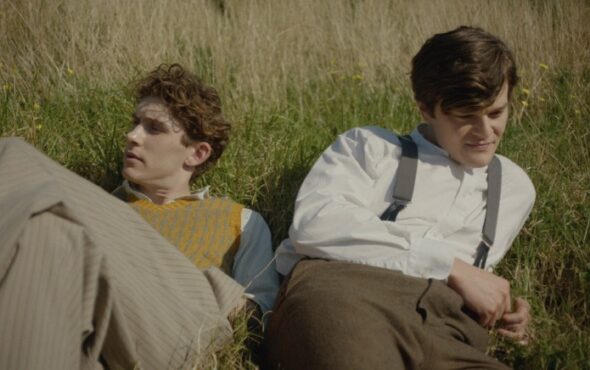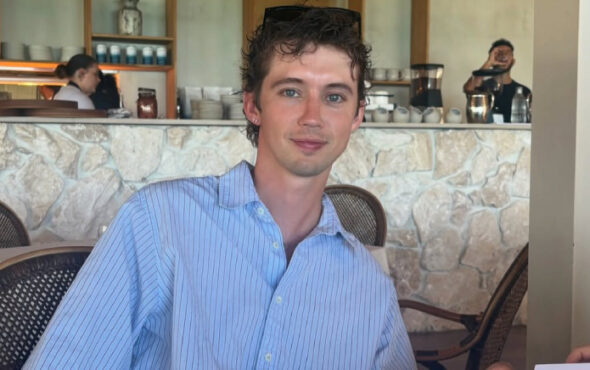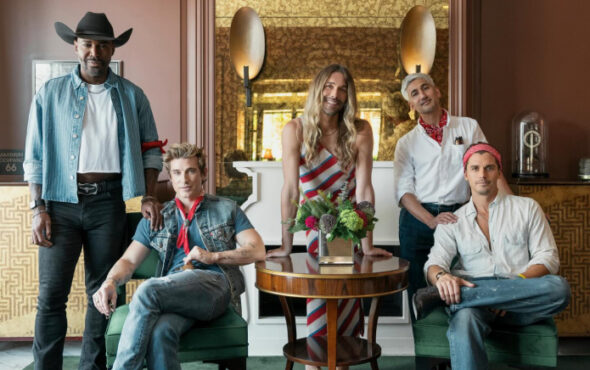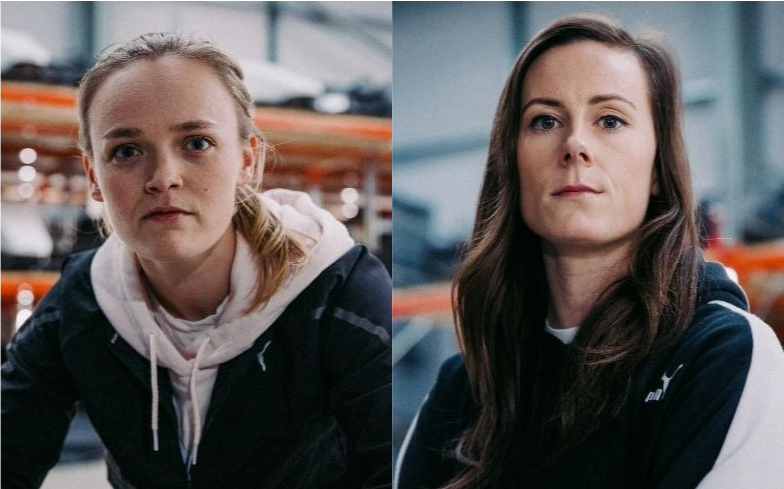
“I just go through my life being who I am, being with who I want to be with, and hopefully that’ll give some Russian kids some confidence and comfort in being themselves as well.”
When you think of motorsporting greats, the names that come to mind all have one thing in common: they’re men. Michael Schumacher, Ayrton Senna, Lewis Hamilton. That’s not to say that women can’t be great drivers, it’s just that sponsors flock to the tried-and-tested, denying women their chance to shine.
That’s where W Series comes in, a racing series designed to show that women can drive just as well as men. Its inaugural series last year was a massive success, and its second season is set to be another one, if the current coronavirus pandemic ever allows it to get off the ground.
“I think it’s been no luck that it’s been as successful as it has been,” Abbie Eaton, who is set to make her W Series debut this year, tells us on a Google Hangouts call — remember to practice social distancing! “There’s been a lot of effort put in behind-the-scenes, a lot of investment and a lot of extremely intelligent people behind it to make it work. I think it was always going to be a success, but the thing that has put it in good stead for the first year is the guys who were driving.”
This is echoed by Sarah Moore, who finished eighth in the championship last year: “With the people that were involved from the get go, it was always going to attract a lot of attention.”
But Abbie and Sarah aren’t just adding female diversity to motorsport, they’re also adding some much needed LGBTQ representation to a sport that’s “still seen as a gentleman’s club type thing.” Although these identities don’t matter when they’re out on the track, both are aware of the impact they’re having on fans, especially in places with regressive attitudes toward the LGBTQ community.
“I’m not the sort of person who shoves my sexuality down people’s throats or anything like that, I just go through my life being who I am, being with who I want to be with, and hopefully that’ll give some Russian kids some confidence and comfort in being themselves as well,” explains Abbie.
For Lesbian Visibility Week, GAY TIMES caught up with the two drivers to see how lockdown has been treating them, why some athletes wait until the end of their career before coming out and the impact they might have on the fans and future generations of drivers.
Let’s address the elephant-in-the-room, how has lockdown been treating you?
Abbie: Boring. Actually, I’ve been really busy weirdly since this happened. I had a [racing] sim delivered, I went to pick it up the night before lockdown happened, so I’ve been setting all that up. Been on that a fair bit, and still trying to maintain the whole fitness thing. I train with my trainer on something like this three times a week. And then I’ve taken on some nights for delivery work. I was actually in bed like five minutes ago, and I was sitting here thinking ‘Oh, I’ve got to get out of bed!’ Yeah, I’ve been busy doing just bits and bobs. How about you, Sarah?
Sarah: Yeah, just filled my day with loads of fitness and sim stuff, really. Avoided the housework as much as possible, and chilling in the hot tub, and that’s about me to be fair! I can’t get out of the washing up and all that though.
How have you been keeping fit during the lockdown?
Sarah: I’ve been focusing on my flexibility stuff, going out for a run twice a week and doing a bit more cycling again. Just trying to keep myself active, I don’t have too much in the terms of gym equipment at home, so there’s not too much I can do at the moment.
Abbie: I have a call-up with my trainer, and he’s been giving me x amount of times that I do like strength programmes with him. I’ve got kettlebells, some dumbbells and other bits and bobs of equipment that I use to keep fit and then I do Metcon, which is cardio-based stuff, a turbo-trainer for the bike, I’ve still got to do 5k that Sarah nominated me to do. I’ll do that when I have a day off. To be honest, this working nights thing, it buys you. If I was doing five days in a row, you’d switch onto night-mode, but three days a week where it’s alternating days, it’s a bit of a challenge. But Sarah and I are very similar in we’re very focused on what we need to do, and W Series still hasn’t made a decision on what’s happening this year so we’ve just got to keep at it and whatever happens, we need to deal with it.
The first W Series was such a success, even converting you into a fan Abbie, were either of you surprised by how successful it was?
Abbie: I wouldn’t say I was surprised, if I was to say I was surprised, it was pleasantly surprised. I never want anything that is to do with females in motorsport to fail, so I was hoping for the best for it. I think it’s been no luck that it’s been as successful as it has been, there’s been a lot of effort put in behind-the-scenes, a lot of investment and a lot of extremely intelligent people behind it to make it work. I think it was always going to be a success, but the thing that has put it in good stead for the first year is the guys who were driving. They could’ve gone out and crashed every single race, and it could’ve been an absolute flop, but the level of racing was extremely high. You’re welcome, Sarah.
Sarah: With the people that were involved from the get go, it was always going to attract a lot of attention. There are always going to be people who aren’t going to agree with it, but I think at the end of the day, Abbie can see from the first season what it’s done for the girls who went in to it for the first year, which is why she’s decided to come on board.
What are your hopes for W Series 2020 when it begins?
Sarah: For me, and for most people, when we’ve all been chatting, we’re all aiming for a top five. I want to be on the podium, I got close last year, but if things get going again this year, I’m hoping to bring some silverware home.
Abbie: I just want to make it through to next year! I kind of get pressured into giving a number as to how high that I want to finish, obviously I want to finish as high up as possible. But the main thing, for me, is to gain knowledge and gain experience and how to drive the cars and what to expect, the format of the weekend and all that kind of stuff. If each time I go out in the car, I get better, then that’s all I want to do. Naturally I’m very harsh on myself anyway, and I’ll push myself to be as good as I can be. I think the main thing is to try and get on the track first, whenever that might be.
The 2020 W Series season is supposed to be starting off in Russia. Given the country’s regressive attitudes toward the LGBTQ community, do you have ever get a sense of worry or dread going to a country like that in a race weekend?
Abbie: Me personally, no because I probably think I’m invincible. Generally, when you’re at a race meeting, and especially a race meeting with something like DTM, which is a high-profile event, there’s so much security etc. there anyway, you’re in your own little bubble; so from that side of things it’s probably one of the safest places to be. But also, I think it’s really important to be out and authentic. I’m not the sort of person who shoves my sexuality down people’s throats or anything like that, I just go through my life being who I am, being with who I want to be with, and hopefully that’ll give some Russian kids some confidence and comfort in being themselves as well. I’ll never shy away from that, and maybe if I’m a bit stupid in thinking I’m invincible, then so be it!
Sarah: I’m pretty much the same, I don’t care what other people think, I go around being myself. In terms of a race weekend, the LGBT stuff isn’t at the front of my mind, I’m concentrating on what I’m there to do at the end of the day. When I go back to the hotel, I’ll speak to Carla [Sarah’s fiancé], but other than that, on a race weekend, I’m there to race, and I don’t think about anything else.
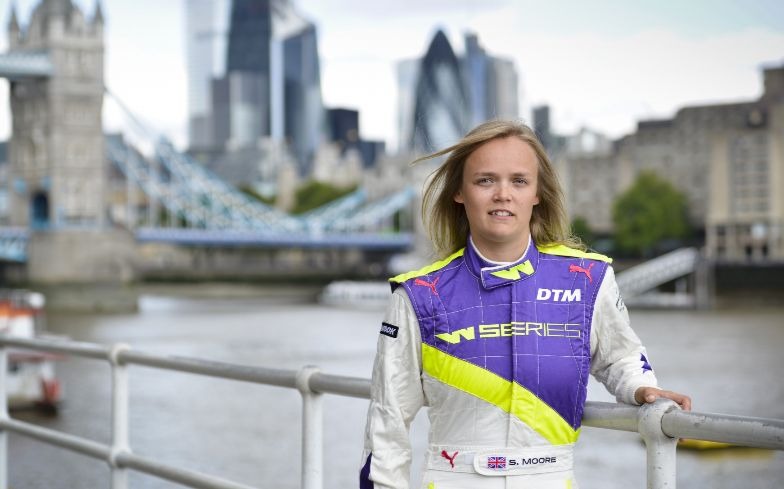
You’re both Ambassadors for Racing Pride, have you seen LGBTQ discourse improving in motorsport since that initiative began?
Sarah: I think that the support that Racing Pride UK has got, I think they’re almost a year old now, since they first started up is growing and it’s still growing now. I know they’ve got some cool things planned for the future. They’ve teamed up with quite a few championships in the UK, so hopefully they can keep pushing and it’ll get seen more across Europe and further on.
Abbie: I’m newer to it, as Sarah was there from the start. Even in the half year that I’ve been part of it, they’ve gone leaps and bounds in the field they’re trying to gain access to. A lot of people have been very supportive of it, and a lot of people didn’t realise there was a lack of, not acceptance, but of promoting acceptance. I think widely, people are okay with LGBTQ+ people, but just having a championship running a Racing Pride sticker or something like that helps to reiterate it to people who aren’t confident that they can come out and be supported, which is always a good thing.
How accepting was motorsport in general of your sexuality and have you ever encountered any homophobia in the industry?
Abbie: I personally haven’t, but other people have. I think it’s the same in any industry and I think probably people worry about it a bit more in motorsport because it’s still seen as a gentleman’s club type thing. It’s about testosterone and being brave and how strong and daring you can be, and people get worried about what others will think of them. Me personally, I’ve been lucky that I’ve had a really supportive network around me. People like me for who I am, they appreciate how fast I am in the car, they appreciate me as a person. It’s not the first thing that comes to mind when I speak to someone, or they speak about me, it’s not ‘Oh, she’s gay’ it’s ‘She’s a brilliant driver, she’s done this, she’s done that.’ The fact that I have a girlfriend isn’t spoken about, which is cool.
Sarah: I’ve not witnessed any problems in my career in motorsport, not that I can remember anyway as I tend to laugh things off. Again, I’ve been lucky to have such a supportive family since I came out, and I actually take Carla to most of my races; she didn’t come to any of the W Series last year, but she’s been to most of my races. And even then, we don’t get any questions, we don’t get any comments, all we get from friends and family is support.
You mentioned that motorsport is seen as testosterone-filled, a very macho environment, do you think this is why we haven’t seen any out LGBTQ male motor racers, until after their career has ended?
Abbie: Possibly, I think you’re referencing to Danny Watts there, but it could be something along those lines, that the guys are shying away from it. If I look at it from my heart, and what I feel, I think people don’t care about it, all they care about is racing. The need to say ‘This is my boyfriend’ they’re not bothered. Behind-the-scenes, they’ve got a boyfriend or they’ve got a girlfriend and they’re happy with it, but all they’re there to do in a racing situation is focus on the racing. I think a combination of the two is why people wait until the end of their career to say ‘This is my partner’ and do it that way. I can’t really comment on it, as I’ve always been out and proud about it.
Sarah: I think that goes for all sports, to be honest. In rugby, there’s been quite a few rugby players who waited until they retired to come out. In some cases, it’s the same for women’s sports as well. It’s progressing, and we’re slowly getting there, but I think some people will always feel more confident in terms of coming out, and it all depends on the amount of support they’ve got around them.
Do you think it would’ve had an impact on you, growing up, to see an LGBTQ person driving a championship, and what impact do you think you’ll have on the future generation of drivers?
Sarah: I definitely think me being open about my sexuality will help the younger generation to understand it more than anything else. We’re not going to force them into anything, that’s not what we’re here to do, we just want them to have an understanding about what it’s all about, and make them feel they have someone to talk to. And that’s why I enjoy the Ambassador role for Racing Pride, because I feel like people can come and talk to me about any problems, or if they’re unsure about anything.
Abbie: I’m quite a headstrong person, so whether having a role model there would’ve made a difference, I’m not sure. I know in the early days of when I was racing, more so in the car world, I remember thinking that as a female in motorsport, you’re seen as a bit of a rarity, and my thoughts were to attract sponsors I needed to be pretty, I needed to be seen as available for the male audience, as most of the main support is male. And I remember thinking if I came out as gay, maybe the sponsors won’t sponsor me, as I wouldn’t be marketable for them. And I remember thinking for a year, and this was before I properly came out, of ‘Do I or don’t I?’ I didn’t want to as I was scared it’d be detrimental to my racing. It wasn’t because I was in fear of people being horrible to me, I was in fear of not having the opportunities. But as I got older, I realised that your life is what you make it, and if you’re fast, then people will support you, if you’re a nice person people will support you. Maybe having a role model might’ve changed that, but I think it was me being uncertain of myself, and with age I dealt with it.
Sarah: You are well old! It’s those wrinkles.
Abbie: All she did on Monday was look at my forehead wrinkles!
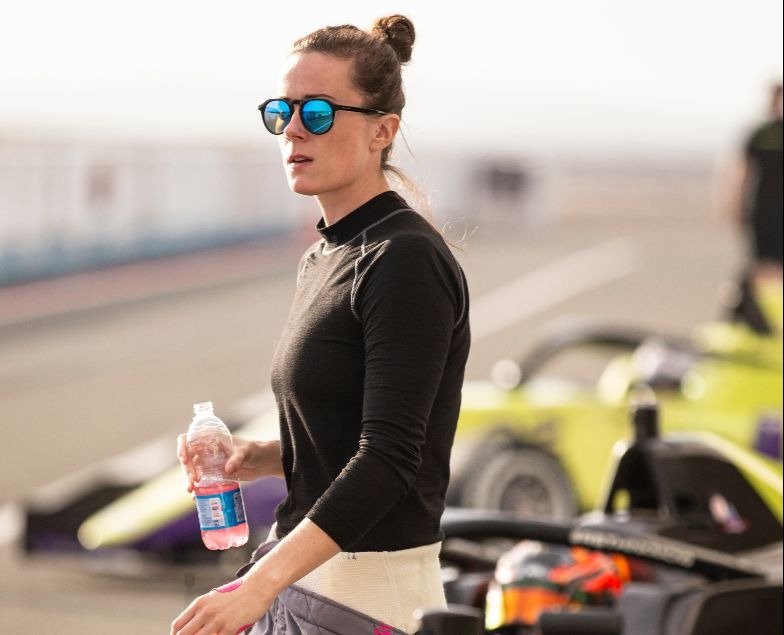
Why do you think it’s important for something like W Series, and also Racing Pride, to exist?
Abbie: I think W Series speaks for itself. The end goal is to get more females into motorsport. The whole reason I was worried at the start was I didn’t want people to go down the route of separating it completely, and if the series was a success, I was worried that people would be like ‘Right, let’s have female motorsport and male motorsport’ and that’s what I was terrified of happening. But they’re going about it in the right ways, and they’re pushing a lot of people to race in other categories, as well as W Series, and race in the mixed championships. I think long-term, we don’t know how effective it’ll be, but I think it’s definitely going to be a positive effect, and it’s super important to keep it going. Hopefully, if we get this season off the ground, we can build on that, and it’ll keep generating for years to come and be the start of something cool.
Sarah: W Series, from my point of view, of what it’s done and the effect it’s had from the first season, we’re always trying to get more females involved in motorsport, whether it’s drivers, mechanics, engineering, anything. But the amount of younger girls I’ve had approach me asking how to get involved in motorsport, or young racing drivers in karting or cars in their junior years that have approached me and said the W Series is great and gives them someone to look up to. When I was younger, I can never remember a female in motorsport that I looked up to. I never really watched Formula 1, everyone knows [Michael] Schumacher and [Ayrton] Senna, but I was never a massive Formula 1 fan, and there was no female to look up in the motorsport world when I was younger. I think it’s nicer that with the W Series, the younger generation have us girls to look up to. Going back to Racing Pride, I think it’s important to give people more knowledge and supporting people whether they’re in the difficult times or if they want someone to talk to.
If W Series led to you driving in another single-seater format like Formula 1, or even Formula 2 and 3, what would that mean to you?
Sarah: For me, Formula 1 has never been my goal. No one would ever turn a drive in Formula 1 down, or even Formula 2 or Formula 3, but for me my ultimate goal has always been Le Man, the European Le Man championship, or even IMSA in America. If I could end up heading down that route, even if I got to race at Le Mans 24 Hours for once, I’d be happy.
Abbie: That’s really cute to hear that! I have similar thoughts, I always watched F1 growing up, but it never sparked massive excitement in comparison to me watching my dad driving in saloon cars and tin-tops, and trading paint with each other and leaning on each other. If you do that in a single-seater, it’s a recipe to ending up upside down. I grew up watching that, and racing in GTs and V8 supercars is where I like to be, and I know a lot of the boys who are quick in DTM have been fast single-seater racers, so if it works out that you end up doing W Series, and then a year in F3 or F2 and then go into DTM, that’s a route I’d be more than happy to go down. If it meant I was siting in a DTM, then happy days.
Sarah: One of the reasons I work for the W Series is for the experience in a car with high downforce. For me, with my career, I knew it was important that I did something like that; I did a year in Formula BMW in 2011, but that’s nothing compared to a Formula 3 car. That was one of the big things that caught my eye for the W Series, I want to end up in the prototypes ideally, so I needed to get that experience. The F3 car for me, is a big learning curve.
Abbie, you were part of The Grand Tour when it was accused of homophobia, why did you feel that it was important to defend the show so, and how was it working there?
Abbie: When The Grand Tour was getting negative stick for being homophobic, I’d worked with them, and been on the set with everyone involved, and the absolute last thing they are is homophobic. I think the world we live in today, it’s very easy to be offended by everything all the time. The episode that caused the issue, I watched it and I was cracking up laughing, I found it really funny. If it was me being insensitive, I don’t know, but I like to think I’ve got quite a level-head, and I’m quite balanced with it, if I ever saw anyone being put down, or any homophobic jibes, I’d be the first to stand up to them. I felt like it was out of place, and blown out of proportion. I made the comment ‘Does anyone realise their driver is gay? Probably not.’ And then that set the internet alight.
I used to watch old Top Gear with them, and there’d be the occasional joke, but it never felt like it came from a place of malice…
Abbie: I think back in the day, they said things that were a little borderline, as back in the day you didn’t have to mind your ps and qs as much, but it always came from a place of humour. Just as you’d make the joke about women driving pink cars, as long as it’s not something that’s truly awful and you can poke fun at yourselves, I don’t see why you can’t do that, and I felt it was important that I stand up for my friends more than anything.
Do you see yourself returning to The Grand Tour one day?
Abbie: There’s the potential to do some more. The format has changed so they only do specials, and the first one was about boats around somewhere. If there’s the need for a race, I’ll be back to do that, but other than they, they’re focusing on bits and bobs they want to do. There were other things in the pipeline before corona got involved, so we’ll see in the future if I can get back on the TV screen in some format.
With it being Lesbian Visibility Week this week, what does it mean to you?
Sarah: I think it’s more about awareness. I’m quite out and proud, as we put it. Like Abbie, there’s always pictures on social media of me and my partner, Carla, but it’s making people aware and just making people feel like they can talk to us.
Abbie: I think any publicity is good publicity and if I can offer any support or comfort or confidence to someone to speak up or ask questions then that’s what I’m here to do, and that’s why I joined Racing Pride as well. I’m lucky that I have a platform that if I can use that to reach a lot of different people, that’s good for me, and to be seen to be giving back. I think Lesbian Visibility Week is something that can be used to do that.

